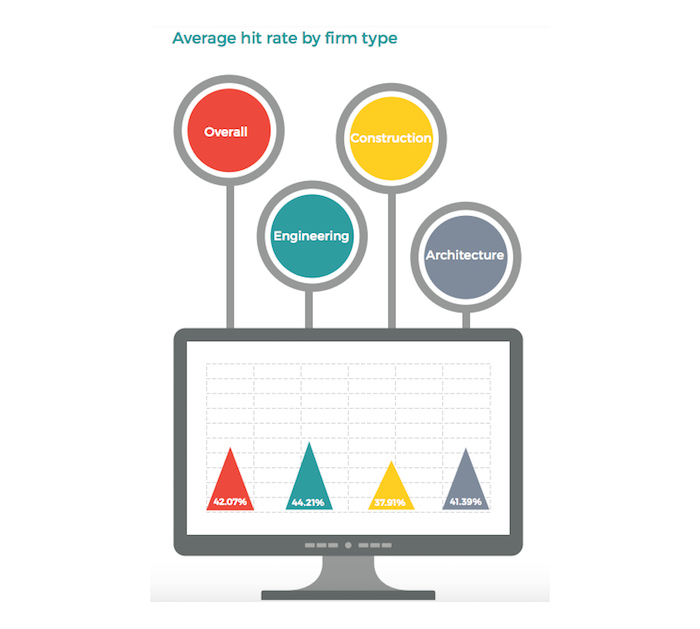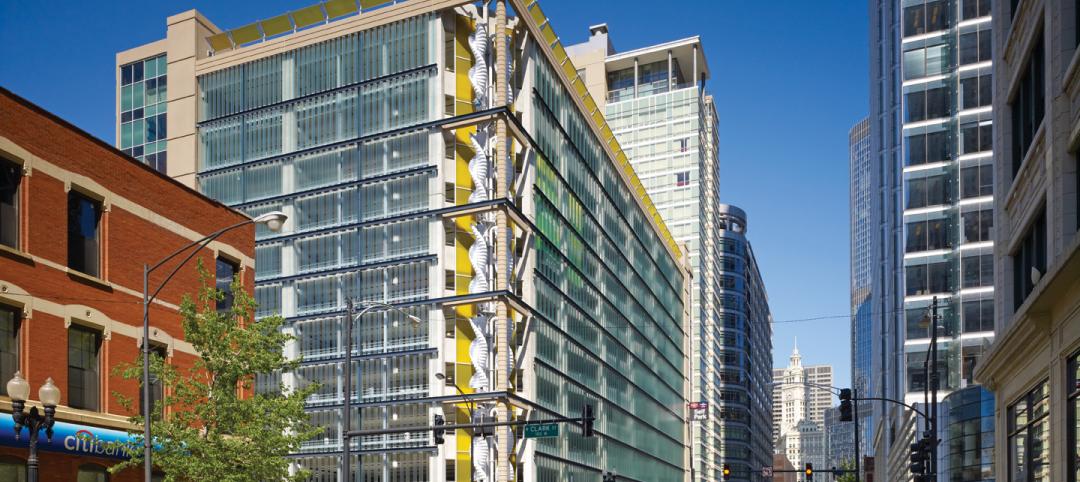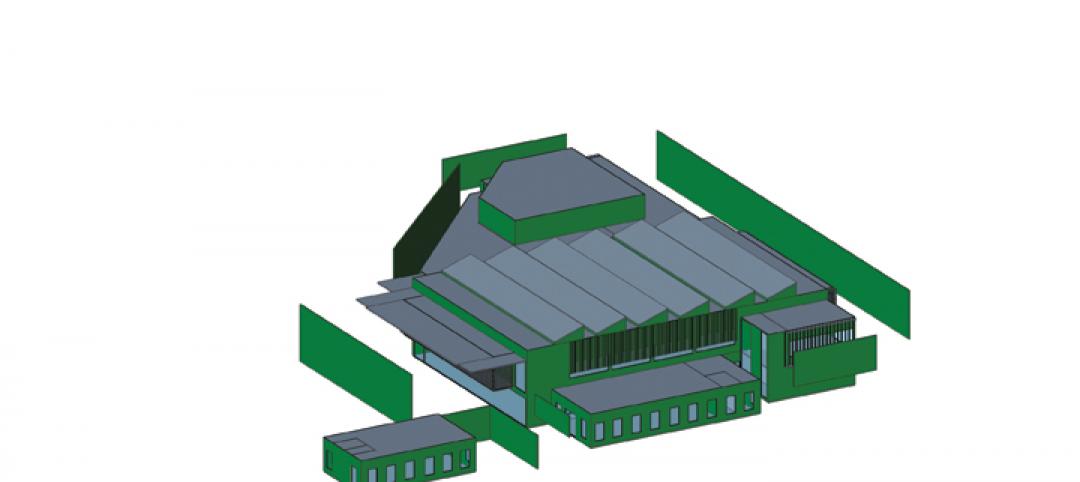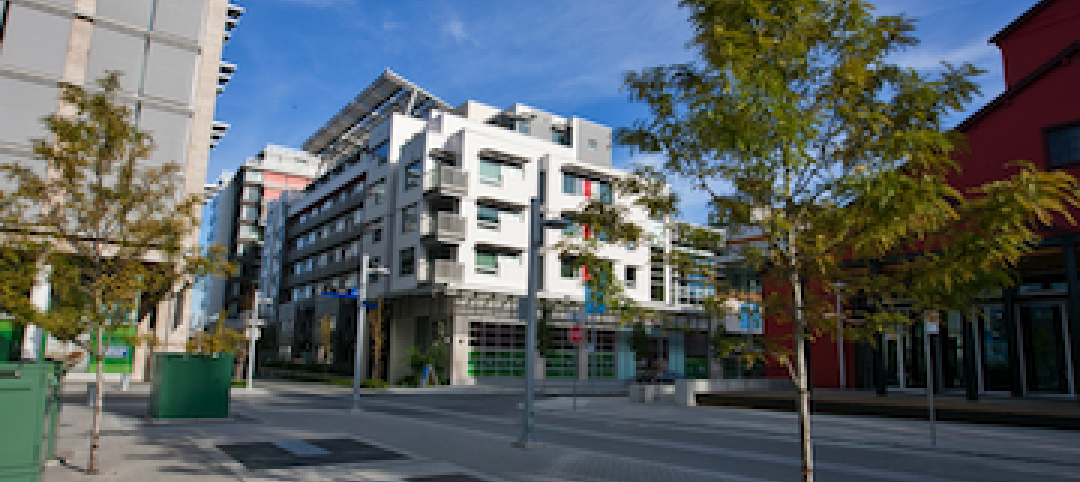New research from the Society for Marketing Professional Services Foundation (SMPS Foundation) finds that average AEC firm hit rate—measured most commonly as the total number of proposals submitted to the total number of projects won—falls within the 37-44% range, depending on the discipline. Engineering firms have the highest average hit rate, at 44.2%. Construction firms have the lowest average hit rate, at 37.9%.
The 22-page report, Measuring for Success: A Look at Hit Rates & Other KPIs in the A/E/C Industries, evaluates the tools and processes that AEC firms use to track marketing success. The findings and analysis are based on a survey of 303 U.S.-based AEC firms conducted by the SMPS Foundation in conjunction with the Southern Illinois University Edwardsville Master of Marketing Research program.
“While there are many variables in tracking hit rates throughout AEC industries, there is a benefit to having a metric for evaluating a firm’s progress,” wrote the report’s authors. “The hit rate provides a baseline over time for firms to improve their success rate and should be used in conjunction with other key performance indicators such as profitability, market trends, and backlog.”
The report addresses a variety of topics, including:
• Methods and metrics AEC firms utilize to track their success of winning projects
• How firms use the hit rate metric to improve future performance
• Alternative key performance indicators
• Effectiveness of hit rate and other KPIs
• Barriers to developing a benchmarking standard for AEC firms
• It concludes with takeaways and action steps for AEC firms.
SMPS members receive a complimentary download of the report once they log on to smps.org.
Nonmembers may download the report with a donation of $24.95 until January 31, 2017.
 Source: SMPS Foundation
Source: SMPS Foundation
Related Stories
| Nov 2, 2010
A Look Back at the Navy’s First LEED Gold
Building Design+Construction takes a retrospective tour of a pace-setting LEED project.
| Nov 2, 2010
Wind Power, Windy City-style
Building-integrated wind turbines lend a futuristic look to a parking structure in Chicago’s trendy River North neighborhood. Only time will tell how much power the wind devices will generate.
| Nov 2, 2010
Energy Analysis No Longer a Luxury
Back in the halcyon days of 2006, energy analysis of building design and performance was a luxury. Sure, many forward-thinking AEC firms ran their designs through services such as Autodesk’s Green Building Studio and IES’s Virtual Environment, and some facility managers used Honeywell’s Energy Manager and other monitoring software. Today, however, knowing exactly how much energy your building will produce and use is survival of the fittest as energy costs and green design requirements demand precision.
| Nov 2, 2010
Yudelson: ‘If It Doesn’t Perform, It Can’t Be Green’
Jerry Yudelson, prolific author and veteran green building expert, challenges Building Teams to think big when it comes to controlling energy use and reducing carbon emissions in buildings.
| Nov 1, 2010
John Pearce: First thing I tell designers: Do your homework!
John Pearce, FAIA, University Architect at Duke University, Durham, N.C., tells BD+C’s Robert Cassidy about the school’s construction plans and sustainability efforts, how to land work at Duke, and why he’s proceeding with caution when it comes to BIM.
| Nov 1, 2010
Vancouver’s former Olympic Village shoots for Gold
The first tenants of the Millennium Water development in Vancouver, B.C., were Olympic athletes competing in the 2010 Winter Games. Now the former Olympic Village, located on a 17-acre brownfield site, is being transformed into a residential neighborhood targeting LEED ND Gold. The buildings are expected to consume 30-70% less energy than comparable structures.
| Oct 27, 2010
Grid-neutral education complex to serve students, community
MVE Institutional designed the Downtown Educational Complex in Oakland, Calif., to serve as an educational facility, community center, and grid-neutral green building. The 123,000-sf complex, now under construction on a 5.5-acre site in the city’s Lake Merritt neighborhood, will be built in two phases, the first expected to be completed in spring 2012 and the second in fall 2014.
| Oct 18, 2010
World’s first zero-carbon city on track in Abu Dhabi
Masdar City, the world’s only zero-carbon city, is on track to be built in Abu Dhabi, with completion expected as early as 2020. Foster + Partners developed the $22 billion city’s master plan, with Adrian Smith + Gordon Gill Architecture, Aedas, and Lava Architects designing buildings for the project’s first phase, which is on track to be ready for occupancy by 2015.
| Oct 13, 2010
Test run on the HP Z200 SFF Good Value in a Small Package
Contributing Editor Jeff Yoders tests a new small-form factor, workstation-class desktop in Hewlett-Packard’s line that combines performance of its minitower machine with a smaller chassis and a lower price.















